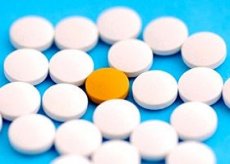Treatment of autoimmune chronic thyroiditis
Last reviewed: 28.05.2018

All iLive content is medically reviewed or fact checked to ensure as much factual accuracy as possible.
We have strict sourcing guidelines and only link to reputable media sites, academic research institutions and, whenever possible, medically peer reviewed studies. Note that the numbers in parentheses ([1], [2], etc.) are clickable links to these studies.
If you feel that any of our content is inaccurate, out-of-date, or otherwise questionable, please select it and press Ctrl + Enter.

Treatment of autoimmune thyroiditis should begin with the appointment of thyroid hormones. An increase in the concentration of thyroxin and triiodothyronine in the blood inhibits the synthesis and release of the thyroid-stimulating hormone, thereby stopping further growth of the goiter. Since iodine can play a provocative role in the pathogenesis of autoimmune thyroiditis, it is preferable to prefer dosage forms with a minimum iodine content. These include thyroxine, triiodothyronine, a combination of these two drugs - thyrotoxic and thyrotope forte, novotyrol. Thyreocomb, containing 150 mcg of iodine in a tablet, is preferred for the treatment of hypothyroidism in endemic goiter, as it compensates for the deficiency of iodine and stimulates the proper functioning of the gland. Despite the fact that sensitivity to thyroid hormones is strictly individual, individuals over 60 years should not be prescribed a dose of thyroxin over 50 mcg, and triiodothyronine should be started with 1-2 mcg, increasing the dose under ECG monitoring.
The appointment of glucocorticoids in autoimmune thyroiditis is problematic in contrast to thyroid hormone therapy, since their immunosuppressive effect is manifested only at relatively high doses and prolonged use. In this case, side effects (osteoporosis, hyperglycemia, arterial hypertension, the formation of steroid ulcers on the gastric mucosa) are likely. After the drug is stopped, the immunosuppressive effect stops. Therefore, the appointment of glucocorticoids in chronic thyroiditis should be strictly conditioned by the need: first, if adequate replacement therapy does not lead to a decrease in goiter size within 3-4 months of treatment; secondly, when there is a rare form of chronic thyroiditis with pain syndrome. The drug is prescribed in such a situation with an anti-inflammatory goal against the background of thyroid hormones. The initial dose of prednisolone is 40-30 mg / day and decreases by 5 mg every 10-12 days.
The total duration of treatment is 2.5-3 months. Reduction of the size of the gland, removal of pain are achieved where inflammatory changes prevail. If fibrosis has developed, no effect is observed. In the case of continued growth of goiter, urgent puncture biopsy is necessary with subsequent surgical intervention. Surgical treatment for chronic thyroiditis is carried out according to absolute indications, which include, first, fast-growing goiters (malignization threat); secondly - the large size of the goiter with compression of the trachea and the main vessels; thirdly - rare painful forms of goiter that do not lend themselves to conservative therapy. A total strumectomy is performed.

